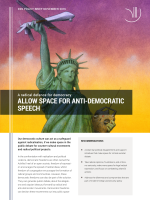Democratic culture can act as a safeguard against radicalisation
In the confrontation with radicalism and political violence, democratic freedoms are often viewed as a problem. Freedom of expression is viewed to encourage the spread of radical ideas and freedom of congregation, the formation of radical groups and communities. However, these democratic freedoms can also be part of the solution. The success criteria for an effective prevention policy, is the absence of political violence and crime, as well as increased democratic participation.
A new policy brief by Tobias Gemmerli, argues for a more democratic approach to those who challenge democracy. Democratic freedoms can generate public debate, about the allegations and utopian ideas put forward by radical and anti-democratic movements. Democratic freedoms can beckon these movements out into public space and uncover the counter-cultural modus operandi.
The brief therefore recommends that we include real political disagreement and support initiatives, which make space for critical societal debate. We should take radical opinions, frustrations, and criticisms seriously, make more space for legal radical expression, and focus on combatting unlawful actions. Finally, we should address the dilemmas and compromises that are part of modern foreign and security policy.

